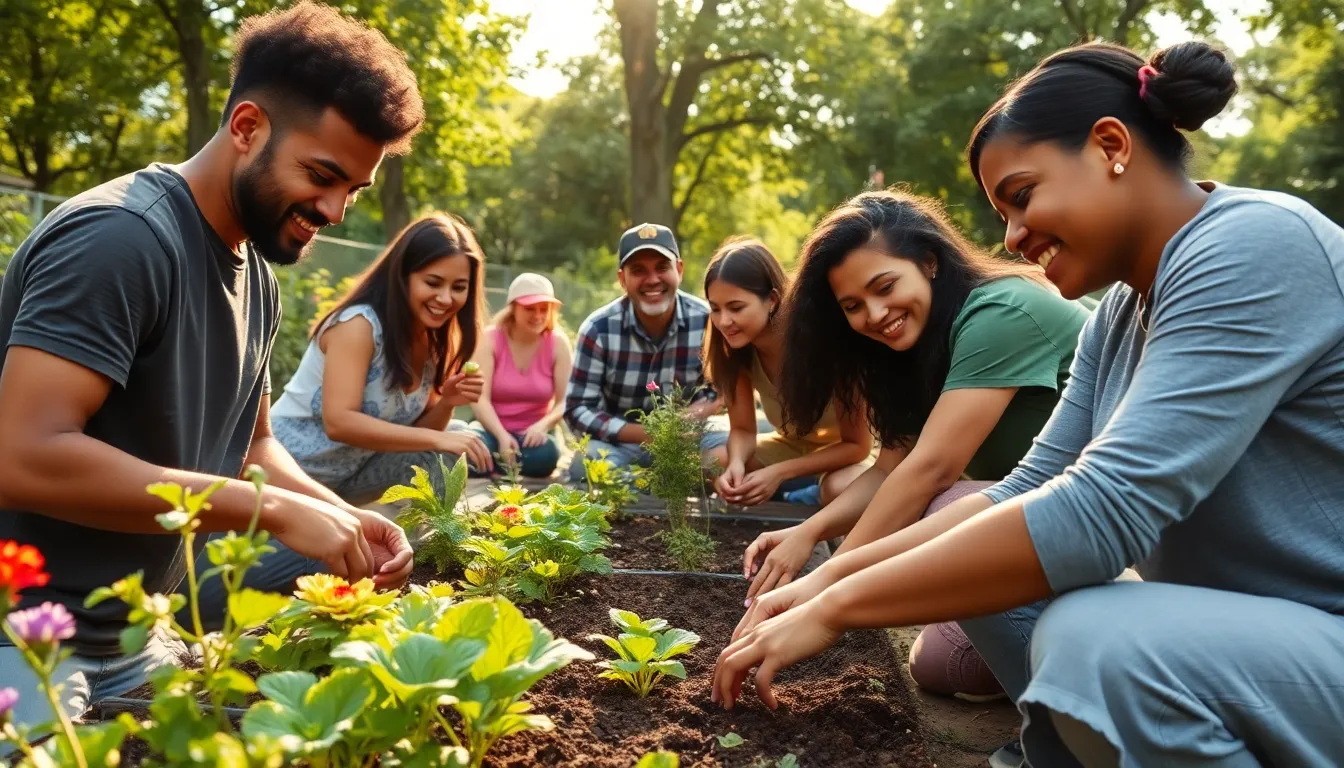Table of Contents
ToggleLiving sustainably isn’t just a trendy hashtag; it’s a lifestyle choice that can save the planet and your wallet. Imagine a world where you sip your morning coffee guilt-free, knowing your cup’s made from recycled materials and your beans are ethically sourced. Sounds dreamy, right? The core philosophy of sustainable living revolves around harmony—balancing human needs with the health of our planet.
At its heart, sustainability encourages mindful choices that minimize waste and promote eco-friendly practices. It’s about making small changes that lead to big impacts, like trading plastic straws for reusable ones or embracing the joys of thrift shopping. So why not dive into the world of sustainable living? It’s not just good for the Earth; it’s a fun challenge that can make life a little richer and a lot greener.
Understanding Sustainability
Sustainability encompasses practices that meet current needs without jeopardizing future generations. It involves a balance between environmental health, economic viability, and social equity.
Definition of Sustainability
Sustainability refers to the capacity to maintain ecological balance by using resources responsibly. This concept emphasizes renewable energy sources, conservation efforts, and reducing waste. Various aspects, including water conservation, biodiversity, and climate action, require attention. It focuses on fostering an interconnected relationship between human activities and the planet’s natural systems.
Importance of Sustainable Living
Sustainable living provides numerous benefits, enhancing both individual lives and the broader environment. This lifestyle reduces waste and conserves resources, helping protect ecosystems. Economic savings arise from lower utility bills and reduced dependency on non-renewable resources. Many communities thrive when sustainable practices are embraced, leading to healthier living standards. Overall, sustainable living contributes to resilience against climate change impacts, ensuring future generations inherit a viable planet.
Core Principles of Sustainable Living

Sustainable living revolves around three core principles: environmental responsibility, social equity, and economic viability. Each principle intertwines, forming a holistic approach to creating a better future for the planet and its inhabitants.
Environmental Responsibility
Environmental responsibility involves making mindful choices that benefit ecosystems. It emphasizes reducing waste through recycling and promoting renewable energy sources. Individuals can support conservation efforts within their communities. Engaging in sustainable practices, such as reducing plastic use or supporting local farms, roots in this principle and creates a healthier environment. Advocating for policies that protect natural resources ensures current initiatives do not compromise the future.
Social Equity
Social equity focuses on fairness and justice within communities. It recognizes that sustainable living includes ensuring everyone has access to resources and opportunities. Supporting local businesses fosters community growth and promotes equitable access to goods and services. In addition, advocating for labor rights highlights the need for fair treatment of those producing sustainable products. Community engagement through volunteerism or educational programs strengthens social bonds and encourages collective responsibility.
Economic Viability
Economic viability highlights the importance of financial sustainability. It demonstrates how eco-friendly choices can lead to long-term savings. Investing in energy-efficient appliances reduces utility bills, creating a more affordable lifestyle. Encouraging local production minimizes transportation costs and supports local economies. Embracing a circular economy promotes resource efficiency and reduces waste, enhancing overall economic health. Recognizing the interconnectedness of environmental, social, and economic actions supports a resilient future.
Practical Applications of Sustainable Living
Sustainable living practices can significantly impact individual lifestyles and the environment. Implementing these practices helps create a more sustainable future for all.
Sustainable Consumption
Sustainable consumption involves making mindful choices that prioritize eco-friendly products. Choosing items with minimal packaging reduces waste and promotes a circular economy. Opting for locally sourced foods supports local economies and decreases carbon footprints. Reusable items, like water bottles and bags, replace single-use plastics effectively. Thrift shopping not only saves money but also extends the life of products. Engaging in these practices fosters a culture of sustainability that benefits communities.
Renewable Energy Sources
Renewable energy sources play a crucial role in sustainable living. Solar power stands out as a popular choice for homeowners seeking to reduce energy costs. Wind energy harnesses natural forces, providing clean electricity without harmful emissions. Hydropower effectively generates energy while conserving water resources. Utilizing these renewable sources decreases dependence on fossil fuels and mitigates climate change. Furthermore, transitioning to these energy options promotes resilience in facing environmental challenges.
Challenges to Sustainable Living
Sustainable living faces multiple challenges that hinder its widespread adoption. Economic factors and cultural resistance significantly impact individuals and communities aiming for more eco-friendly choices.
Economic Barriers
High upfront costs often deter individuals from adopting sustainable practices. Eco-friendly products may carry a premium price compared to conventional alternatives. Limited access to financial resources further complicates decision-making for many households. Some people may prioritize immediate needs over long-term investments in sustainability. Additionally, businesses offering sustainable options might struggle to compete with cheaper, less eco-friendly products, limiting consumer choices.
Cultural Resistance
Cultural norms and values play a crucial role in the acceptance of sustainable living. Many people cling to traditional lifestyles, viewing sustainable practices as inconvenient or unnecessary. Skepticism toward environmental issues can also foster resistance to change. Some individuals perceive sustainable practices as elitist, creating a divide between those who embrace them and those who don’t. Education and awareness efforts remain essential to overcoming these cultural barriers and encouraging broader acceptance of sustainable living.
Living sustainably is more than just a trend; it’s a fundamental shift towards a more balanced existence. By embracing the core principles of environmental responsibility social equity and economic viability individuals can create a meaningful impact on their lives and the world around them.
Small changes in daily habits can lead to significant benefits not only for personal finances but also for the health of the planet. As people become more aware of their consumption patterns and the importance of sustainability they contribute to a collective movement that fosters resilience against climate change.
Ultimately sustainable living is about making choices that honor the planet its resources and future generations. It’s a commitment to a better quality of life for all.







